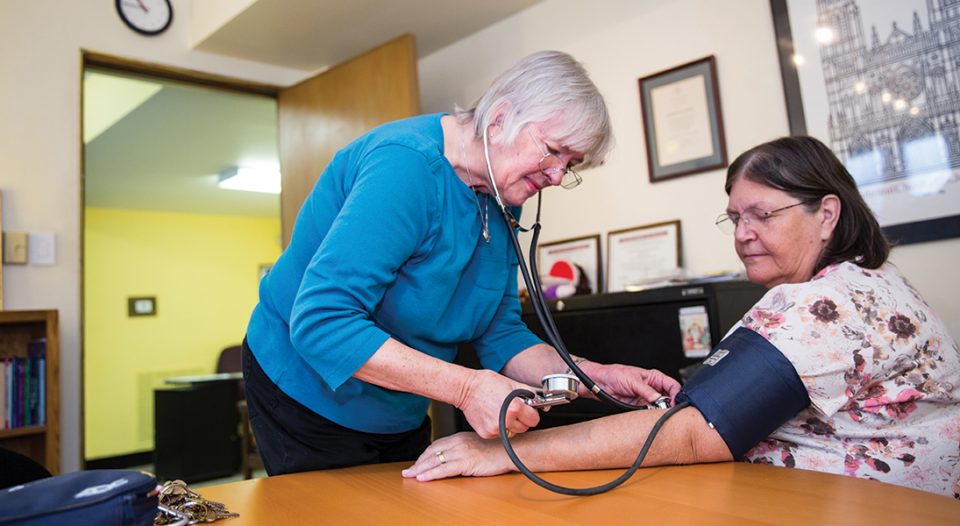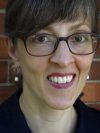For most of the past two centuries, healing and faith were as intertwined as the serpent encircling the rod in the symbol for medicine. Jesus and his disciples healed not only physically but also spiritually, and their faithful model of Christian caring created the template for modern-day nursing.
While nursing has always been about caring, healing has become more institutionalized, moving out of homes and churches and into health-care facilities. But in 1984, Granger Westberg, a Lutheran parish pastor, hospital chaplain, and divinity and medical school professor, built a bridge called parish nursing.
Envisioned as a partnership between health-care systems and congregations, with the first at Lutheran General Hospital in Park Ridge, Ill., and six churches, parish nursing now operates under many different paradigms. Paid by health-care systems, congregations or not at all; working full time, part time, or shared among congregations and/or medical facilities; working solo or with a team; serving in congregations large and small, urban and rural—ELCA parish nurses promote wholeness and wellness in a variety of ways.
But their goals are the same: parish nursing is based on Westberg’s belief that true healing involves the body, mind and spirit.
Michelle Knapp, a registered nurse, heard Westberg talk about his—in her words— “brand-new, strange idea” at Immanuel Lutheran Church in the Edgewater area of Chicago and became part of the second group of parish nurses he hired at Lutheran General. She began part time, shared with Ebenezer Lutheran Church in Chicago’s Andersonville neighborhood, but moved quickly to full time between the two.
Neither church is huge, with about 100 at worship, but the pastors were, Knapp said, “very committed to the holistic vision of health—emotional, spiritual and physical.”
In her congregations, from which she retired in December after 28 years, Knapp did what many parish nurses do: established groups for caregivers, people who are grieving and others; scheduled wellness screenings; led retreats; called on—and advocated for—sick parishioners in homes or hospitals; and much more.
Knapp wishes parish nursing would evolve more quickly because the need is great. Hospitals can’t provide as much spiritual help anymore. She has seen the need not just from her experiences with Westberg and her congregations but also as a board member of the Evangelical Lutheran Parish Nurse Association (ELPNA).
A healthy perspective
That nonprofit, founded in 2004 by parish nurses in Minneapolis and St. Paul, Minn., is open to registered nurses (RNs) who have completed a 40-hour parish nurse preparation class and work with an ELCA or other Lutheran congregation, or belong to a Lutheran congregation and work in a different denomination’s church. (The vocation is also called faith community nursing because of the many
denominations where this care happens in about 30 countries.) Members—there are 120, but hundreds more serve as ELCA parish nurses—are present at all major churchwide gatherings.
“Parish nurses can help clergy and parishioners understand the connectedness with how being well or unwell affects our whole being,” said Carol DeSchepper, ELPNA’s national board chair. “They can help people navigate the health system and support them during life transitions in ways that a pastor might not have time to follow over a long period. In addition, a parish nurse can encourage pastors and youth leaders to incorporate health information into their parts of the ministry.”
Tammy Devine, a RN, parish nurse coordinator, founding ELPNA member, ELCA deacon and the wellness manager for Portico Benefit Services (previously ELCA Board of Pensions), has seen all sides and said parish nurses remind congregants and church staff of “the importance of caring for self so we’re in the best place to be able to be equipped to go back out to serve.”
At Luther Seminary, St. Paul, Minn., pastors learn firsthand about the gifts of parish nurses. It’s the only ELCA seminary with a parish nurse on staff and the only one to offer a graduate certificate program for parish nurses, who take courses such as Thinking Theologically-Confessing Publicly alongside future pastors.
Lois Malcolm teaches that class and has led continuing education for parish nurses. She agrees that having nurses and seminarians in the same class deepens their understanding of one another “but also complicates it,” she said. “Nurses are very practical and force their classmates to be more attentive to nitty-gritty questions related to health and death. Especially for people studying for the ministry, this brings a very healthy perspective.”
Congregational care
At St. Peter Evangelical Lutheran in Southport, N.C., parish nurse Vicki Carlson added four nurses—two retired and two working full time elsewhere—to the pastoral care roster as the congregation doubled to about 450 people.
The congregation’s shepherding groups are divided into four regions, and each nurse is responsible for one, with about 60 families. They are trained to do everything she does (visit, administer communion and more), but they work in the field and she is based at the church. Carlson also sits on the local Interchurch Fellowship Committee to be a bridge to the community.
She is the only paid nurse. In fact, not only is she listed on St. Peter’s website, but her phone number is also on its answering machine for those who might need her help.
Jim Simon never thought he’d want it, but the retired nuclear power plant operator/instructor and his wife, Wendy, appreciated Carlson’s visits when ill and another nurse’s input when Jim needed to make decisions about a medical diagnosis. “The combination of looking at what’s going on from a medical standpoint as well as a spiritual standpoint works out pretty well,” he said.
Cindy Harris, a part-time, unpaid parish nurse at Mount Zion Lutheran Church in Tucson, Ariz., keeps more of a low profile when she’s not planning programs such as monthly blood-pressure checks.
Both Carlson and Harris serve in areas heavily populated with retired people, but parish nursing isn’t only about caring for seniors.
“If you do it right, a parish nursing ministry tends to take on the look and feel of the demographics of that congregation,” said Dave Nelson, who served in a congregation with 1,600 members—including 300 kids in Sunday school—before becoming pastor of St. Peter. “In Harrisonburg, we had birthing and parenting classes, and a lot of health and wellness stuff that was very attractive for young people.”
Dan Valasakos, a pastor of Mount Zion, said it this way: “To be healthy and well and have a healthy spirit and mind definitely is what a church congregation should be emphasizing insofar as faithful discipleship.” And he knows a thing or two about linking healthy minds and healthy bodies since he was a public-school gym coach in his first career.
“In very, very concrete ways,” said Malcolm from Luther Seminary, “the church talks about salvation in relation to bodies because we are part of Christ’s body, [we]eat and drink Christ’s body. Our bodies are the place where Christ is manifest. One challenge for the church today is to reclaim bodily practice and the fact that faith is connected to our bodies.”
Creating a health ministry
Check out these resources to learn more about parish nurse programs:
ELCA social statement on health care: “Caring for Health: Our Shared Endeavor.”
Evangelical Lutheran Parish Nurse Association.
Westberg Institute for Faith Community Nursing.
Stronger Together by Jill Westberg McNamara.
“It Takes a Congregation”
by Sharon Hinton, Church Health Reader.





